
When Margo became pregnant, she was told that her baby had a severe form of spina bifida that would affect every aspect of her life. Today, her daughter Sarah is 31 years old. She’s intelligent, caring, and loves to laugh. Thanks to a Mitrofanoff procedure and finding just the right intermittent catheter with 180 Medical, she’s discovering independence as an adult with spina bifida.
Spina Bifida: The Snowflake Condition
Around 1,400 babies are born with spina bifida each year in the USA. It’s sometimes called “the snowflake condition,” because each individual’s experience of living with spina bifida differs. Symptoms can range from mild to severe, and not everyone has the same challenges.
Also, around 15 to 25% of kids born with spina bifida also have hydrocephalus, which is sometimes called “water on the head.” This condition involves having excess cerebrospinal fluid inside the head, which can cause swelling and even a type of brain injury if there is too much pressure.
When Margo found out she was pregnant with a baby that had hydrocephalus and spina bifida, she didn’t know where to turn for information or help. Back then, the internet wasn’t readily available. She could only find a few books on the topic, but those weren’t much help for preparing for what life would be like.
“Everything is so different as a mother of a child with spina bifida,” says Margo. “I never had any other kids before or after Sarah, so I never had anything to compare it to, even with my other friends who had babies. Even after talking to my doctor, I still wasn’t prepared for all of the supplies we would need or how different our life would be.”
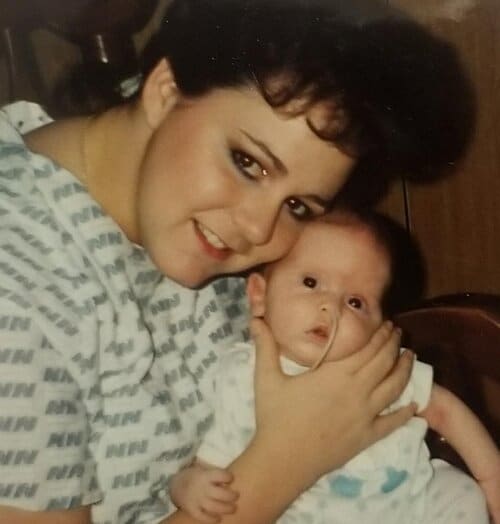
Adapting to Life as a Spina Bifida Mom
When Sarah was born, Margo’s doctors told her that because the hydrocephalus was so severe, Sarah might not be able to eat or cry or walk or talk. “They said if she lived through the night, she may be a ‘vegetable’ and need to be institutionalized.”
Margo says she heard them but refused to accept that prognosis. “After six weeks, I took her home with me, and I did all the things you would normally do as a new mother. I worked with her. She started getting physical therapy very early. At times, she would do things slower than other people, but she almost always ended up being able to do it. However, back then, we didn’t realize what kinds of issues we would face with her bladder and bowels.”
Margo was able to be a stay-at-home mom through much of Sarah’s childhood. From major surgeries like bladder reconstruction to complications like anemia, Sarah has faced plenty of challenges, but Margo has faced them all with her. This also involved helping Sarah with her bladder and bowel routines.
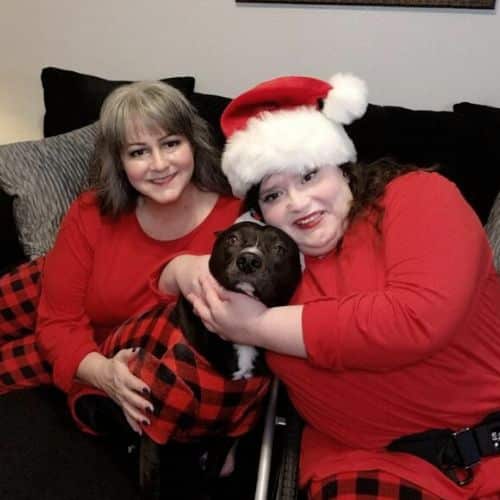
Learning to Catheterize After Mitrofanoff Procedure
For much of Sarah’s life, her bladder has been dysfunctional, which meant needing to use incontinence supplies. Once she was in high school, she was ready to become more independent and mobile.
Sarah’s pediatric urologist, Dr. Dominic Frimberger of OU Health, brought up the idea of undergoing a Mitrofanoff procedure. This is the surgical creation of a new channel (usually made from the appendix) through which urine can leave the body via intermittent catheterization. The opening is typically on the lower belly or the belly button itself.
After the Mitrofanoff procedure, Margo would need to take over catheterizing Sarah for a while with the goal of getting her as independent as possible.
“Before that, we had never used catheters. I knew I needed somebody who knew what they were talking about,” says Margo. They needed assistance with choosing the right catheter for Sarah’s needs. Plus, they wanted help with learning how to use catheters safely and hygienically.
Finding the Best Catheters for Sarah at 180 Medical
Margo and Sarah were brand new to the world of catheters. Thankfully, Sarah’s healthcare team referred them to 180 Medical for their catheter supply needs.
Many people new to using catheters aren’t even aware that there are multiple brands and catheter types, sizes, and features. That’s why 180 Medical emphasizes the importance of choice. We want our customers to have a catheter that truly works best for them and fits their needs.
“Right off the bat, 180 Medical sent us lots of samples so we could try them out and figure out what would work best for Sarah,” says Margo. “It was a process of elimination, some trial and error. It took trying all of the samples to know which would work. 180 Medical worked hard to accommodate whatever we needed. They sent us step-by-step cathing instructions too.”
Sarah is prone to getting UTIs (urinary tract infections), so having a touch-free closed system catheter, the Rusch MMH H2O Closed System Catheter, has really helped. It keeps her hands off the catheter tube itself so the cathing process can be more hygienic and sterile, thereby reducing the potential risk of infection from contamination.
She likes that it’s easy to use, and everything she needs is already in the pack. She can self-cath from her wheelchair, thanks to the attached urine collection bag. Also, it’s easy to tote around wherever she goes in a bag she keeps hanging on her chair.
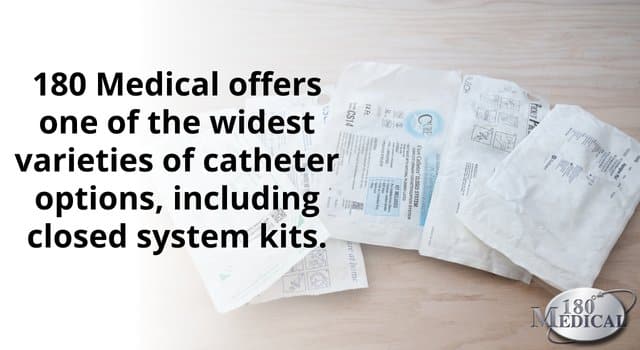
Getting the Right Customer Service Matters
Margo says that getting the right catheter has made a huge impact on Sarah’s quality of life. However, she says that getting the right customer service is very important too.
“It’s a very personal thing. Using a catheter is very private. When you talk to the people at 180 Medical, they really understand. It’s like you’re just talking about the weather.”
At 180 Medical, we understand that talking about your need for catheters can feel intimidating at times. Our specialists are professionals that not only understand our products inside and out, but they also listen and treat your needs with compassion and care.
“Any time that I’ve had an issue or a question, I’ve always been able to reach someone quickly, and they’re always very knowledgeable,” says Margo. “They know exactly what they’re talking about at 180 Medical.”
Living Independently As an Adult with Spina Bifida
These days, Sarah is discovering independence now that she can self-cath all on her own.
She admits that when it was time for her to take over her own self-catheterization routine, she went through the normal feelings of fear at first. She says she thought, “Oh my, what if I can’t do this? What if I mess something up?”
But now she’s a pro! Sarah even helped out a friend who was facing the new challenge of learning to use catheters. “I told her, it changes your life. You don’t have to rely on your grandma or your mom to change your briefs anymore. You can go anywhere you have privacy: your bathroom, your bedroom, wherever you’re comfortable. You don’t realize how much more independent you can be. There’s a feeling of accomplishment. There really is.”
Sarah recently turned 31, and her birthday is an occasion her mom and family go all out to celebrate with a fun theme and outfits and, of course, a decorated cake. She loves 80s music and is a total movie buff.
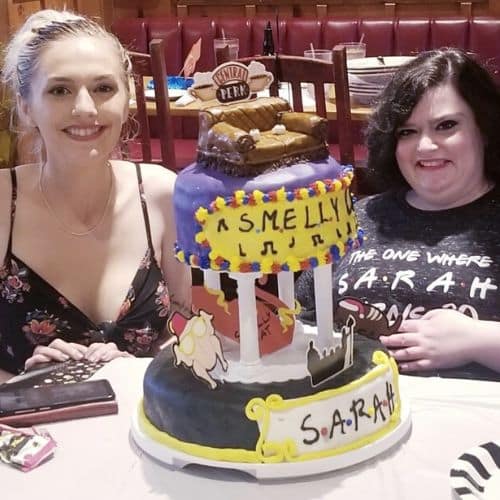
She loves her constant companion, Beetlejuice, who she affectionately calls “the best dog in the whole wide world.” She has fun hobbies like making bracelets and jewelry, and lately, she’s been considering giving some of her time to volunteer at a local animal shelter.
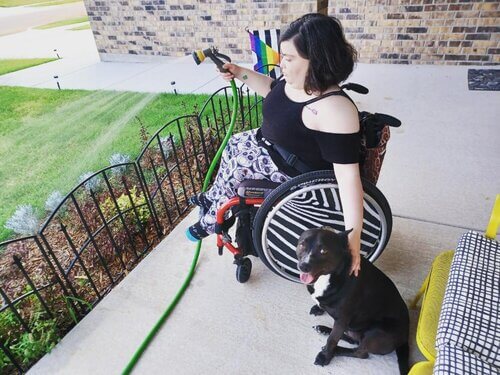
“Her life is different than your average person,” says Margo. “But she’s proof that you can still find a happy life, no matter what hand you’re dealt in life.”
